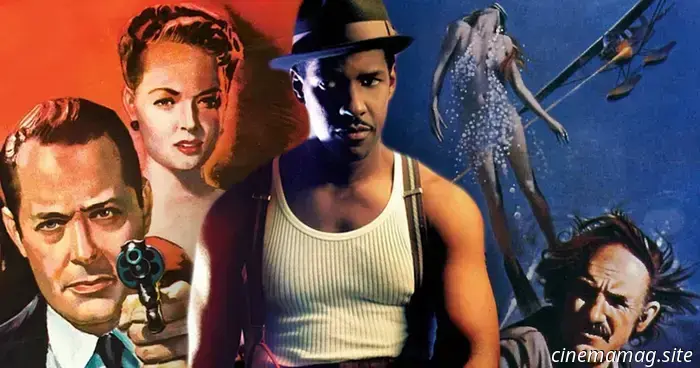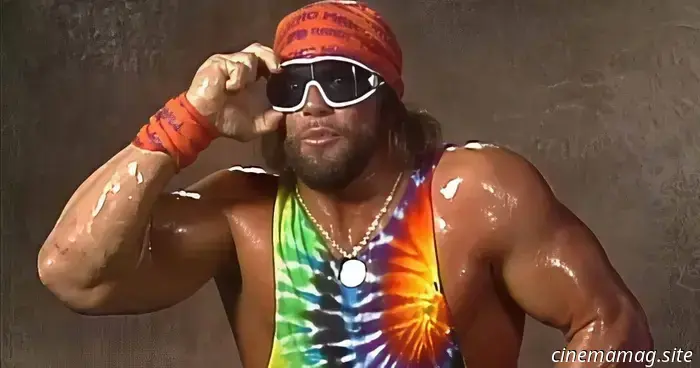
6 Private Investigator Films That Warrant More Appreciation
Casey Chong presents six underrated films featuring private detectives that you should check out.
Movies centered around private investigators have a long history, dating back to the black-and-white classic noir era, with iconic titles like The Maltese Falcon, Murder, My Sweet, and The Big Sleep serving as key examples. More contemporary films, including Vertigo, Klute, L.A. Confidential, and Knives Out, illustrate that this genre remains relevant today. Keeping that in mind, here’s a list of lesser-known private investigator films that may not have received the same level of recognition as their more famous counterparts, yet are definitely deserving of a place on your watch list.
**Dead Men Don’t Wear Plaid (1982)**
Carl Reiner, who wrote and directed this film and also appears as Field Marshal Wilfried Von Kluck, parodies 1940s film noir while simultaneously honoring the genre. The film is shot in a classic black-and-white style and features Steve Martin as Rigby Reardon, a private investigator hired by Juliet Forrest (played by Rachel Ward), the daughter of a famous cheese scientist, to look into her father’s death. A standout aspect of the film is Reiner’s clever integration of footage from classic noir films like The Big Sleep, Double Indemnity, and Notorious, enabling Reardon to “interact” with characters like Humphrey Bogart’s Philip Marlowe. Martin’s impeccable comic timing and deadpan humor add to the film’s charm, making him the central figure that ties everything together, whether he’s in hysterics over the phrase “cleaning woman” or maintaining his composure amidst chaotic situations.
**The Big Fix (1978)**
Jeremy Kagan adapts Roger L. Simon’s novel, presenting Richard Dreyfuss as an unconventional private investigator—not the typical cynical figure, but rather a flawed everyman who enjoys spending time with his children. Though he has a gun, he opts not to use it, even placing a crayon in the barrel. The first half of The Big Fix is a relaxed character-driven comedy-drama that alternates between Dreyfuss’s character Moses Wine’s personal life and work. The main plot involves Wine being enlisted by his ex-girlfriend Lila (Susan Anspach) to look into a political smear campaign, taking a backseat to Dreyfuss’s likable and quirky performance. The film effectively shifts tone midway through, especially following a character’s death, while Kagan integrates the political disillusionment of the 1970s, enhancing the film’s impact. The Big Fix also features Bonnie Bedelia in a supporting role as Wine’s ex-wife, Suzanne.
**Lady in the Lake (1947)**
The 1940s noir detective genre was heavily influenced by classics like Double Indemnity and The Big Sleep, with archetypal characters and distinct visuals. However, director Robert Montgomery, who plays Phillip Marlowe, offers a bold and innovative take by primarily shooting the film from his character's perspective, allowing the audience to see only what he sees. This unconventional approach was groundbreaking at the time of its release, adding a fresh twist to the typical detective noir of the 1940s. Montgomery appears only at the beginning of the film, addressing the audience about what to anticipate. While Lady in the Lake may have been divisive upon its release, Montgomery's ambition to elevate the genre is undeniable.
**Night Moves (1975)**
Arthur Penn, known for his landmark film Bonnie and Clyde, directs this subtle, character-driven neo-noir thriller featuring Gene Hackman. Hackman plays Harry Moseby, a private investigator hired by former actress Arlene Iverson (Janet Ward) to find her missing 16-year-old daughter (Melanie Griffith in her film debut). The highlight is Hackman’s cynical and disillusioned character arc, showcasing his nuanced acting skills. Penn and cinematographer Bruce Surtees effectively capture the oppressive heat of the Florida setting and create a moody neo-noir aesthetic in Night Moves. The film takes a measured pace, favoring character depth over conventional investigative thrills, as it explores Moseby’s troubled personal life, marked by a sense of despair and ambiguity.
**Zero Effect (1998)**
Bill Pullman’s character Daryl Zero, touted as “the world’s most private detective” on the movie poster, is a literal interpretation of the phrase. He diverges from the typical private investigator by relying on his beleaguered assistant Steve Arlo (Ben Stiller) to handle client interactions. Pullman delivers a quirky and intellectually rich performance as this eccentric private investigator, creating one of his career's standout roles. Stiller complements Pullman perfectly, demonstrating his comedic talents. Their eccentric, Holmes/Watson-like relationship injects a unique charm into the film. Unfortunately, despite Jake Kasdan’s promising directorial debut, Zero Effect only grossed $2 million against







Other articles
 Comic Book Sneak Peek – Spirits of Violence #1
Marvel Comics is set to debut its new Ghost Rider series, Spirits of Violence, this Wednesday. Take a look at the official preview of the first issue below… Johnny Blaze, Danny Ketch, Robbie Reyes, Kus…
Comic Book Sneak Peek – Spirits of Violence #1
Marvel Comics is set to debut its new Ghost Rider series, Spirits of Violence, this Wednesday. Take a look at the official preview of the first issue below… Johnny Blaze, Danny Ketch, Robbie Reyes, Kus…
 The McFarlane's DC Multiverse Wonder Woman and Godzilla 2-pack has been officially revealed.
McFarlane Toys has officially revealed its action figure set featuring Wonder Woman and Godzilla from the DC/MonsterVerse comic book crossover series, Justice League vs. Godzilla vs. Kong. It is now available for pre-order…
The McFarlane's DC Multiverse Wonder Woman and Godzilla 2-pack has been officially revealed.
McFarlane Toys has officially revealed its action figure set featuring Wonder Woman and Godzilla from the DC/MonsterVerse comic book crossover series, Justice League vs. Godzilla vs. Kong. It is now available for pre-order…
 A biopic about ‘Macho Man’ Randy Savage is being developed by producer Kenan Thompson.
The excitement is about to unleash on the big screen, as Deadline has revealed that a biopic about the iconic professional wrestler ‘Macho Man’ Randy Savage is currently in development. The film is being…
A biopic about ‘Macho Man’ Randy Savage is being developed by producer Kenan Thompson.
The excitement is about to unleash on the big screen, as Deadline has revealed that a biopic about the iconic professional wrestler ‘Macho Man’ Randy Savage is currently in development. The film is being…
6 Private Investigator Films That Warrant More Appreciation
Casey Chong presents six underrated private detective films that you should explore. Movies featuring private investigators have a long history, dating back to the black-and-white period when clas...
